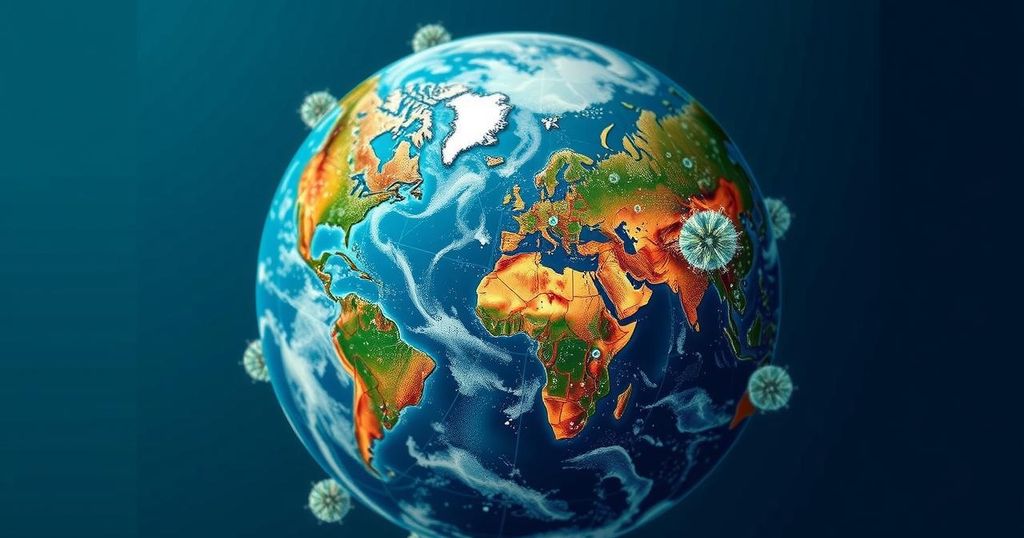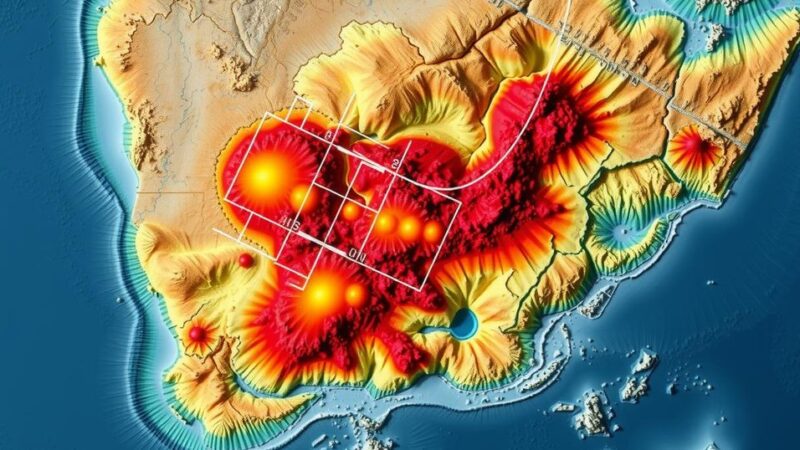Recent reports highlight that severe wildfires have intensified the accumulation of greenhouse gases, with carbon dioxide levels reaching alarming historical highs. The World Meteorological Organization indicates a potential vicious cycle where rising temperatures could further increase greenhouse emissions due to reduced absorption capacities of natural ecosystems. The upcoming U.N. climate talks in Azerbaijan are seen as crucial for establishing strategies to combat these pressing climate challenges.
BANGKOK — Recent severe wildfires have exacerbated the rapid rise in greenhouse gas levels in the atmosphere, illustrating a potential self-reinforcing cycle linked to climate change, as emphasized by the United Nations weather agency. According to the World Meteorological Organization (WMO) in its annual Greenhouse Gas Bulletin, atmospheric carbon dioxide concentrations are now reminiscent of levels present two to three million years ago, a period characterized by an average temperature that was approximately 3 degrees Celsius warmer and sea levels that were 10 to 20 meters higher than current measurements. The WMO reported that emissions of carbon dioxide derived from fossil fuels and cement production are outpacing the natural absorption capabilities of oceans and forests, leaving unabsorbed carbon dioxide to remain in the atmosphere for centuries and contributing to the greenhouse effect that leads to climate warming. “These are more than just statistics. Every fraction of a degree of temperature increase matters,” stated Ko Barrett, the agency’s deputy secretary-general, at a press conference in Geneva. She elaborated on the implications of rising temperatures, noting that it impacts glacier and ice melting rates, accelerates sea-level rise, and exacerbates oceanic heat and acidification. Furthermore, Barrett stated, “It matters in terms of the number of people who will be exposed to extreme heat every year, the extinction of species, the impact on our ecosystems and economies.” The imminent 29th U.N. climate negotiations, set to occur next month in Azerbaijan, come at a critical juncture. The host country’s economy significantly relies on oil and gas exports under an authoritarian regime led by President Ilham Aliyev. During the landmark climate negotiations in 2015, approximately 195 nations pledged to strive towards limiting global temperature increases to 1.5 degrees Celsius above preindustrial levels. However, many climate scientists caution that, with ongoing fossil fuel dependency, greater warming is already assured for later this century. Currently, the global temperature has risen approximately 1.2 degrees Celsius, with sea levels increasing by about 24 centimeters since 1880. The WMO also indicated that catastrophic wildfires, such as those seen in Canada and Australia, have contributed to persistently elevated carbon dioxide emissions from both anthropogenic and industrial sources in 2023. Moreover, the transition from a prolonged La Niña phase to the warmer El Niño phase has potentially diminished carbon absorption by forests, as vegetation tends to uptake less carbon under elevated temperatures. Despite these challenges, the WMO ascribed the significant increase in greenhouse gas concentrations primarily to historically high levels of fossil fuel emissions over recent decades. The global average carbon dioxide concentration reached 420 parts per million in 2023, marking the twelfth consecutive year of an annual increase exceeding 2 parts per million. The WMO warned that carbon dioxide is accumulating at the fastest rate in human history. The organization raised concerns regarding the combined effects of elevated temperatures that could lead to the environment becoming an enhanced source of greenhouse gases. Such phenomena include increased carbon dioxide emissions from wildfires and reduced absorption capabilities of warmer oceans and lands, culminating in a heightened concentration of greenhouse gases in the atmosphere and accelerating global warming. As stated, “These climate feedbacks are critical concerns to societies worldwide.”
The United Nations Weather Agency has released critical data linking rising greenhouse gas levels to climate extremes, including severe wildfires and shifting oceanic conditions. This report precedes global climate negotiations, emphasizing the urgency of addressing climate change and the impacts of human-induced emissions. Wildfires and changes in weather patterns underline the need for immediate action and international cooperation to avert worsening climate scenarios.
In summary, the current rise in greenhouse gas concentrations, particularly carbon dioxide, presents significant risks to global temperatures, sea levels, and ecosystems. With fossil fuel emissions continuing to increase and the climate facing potential feedback loops that could exacerbate the crisis, it is imperative that nations prioritize climate action. The upcoming U.N. climate negotiations in Azerbaijan will be critical in determining the future trajectory of global climate policy.
Original Source: www.rfa.org







